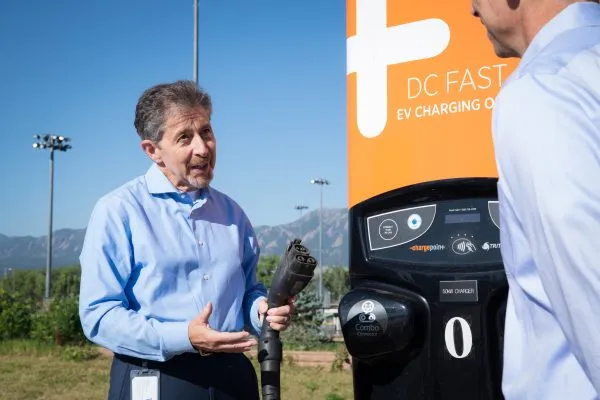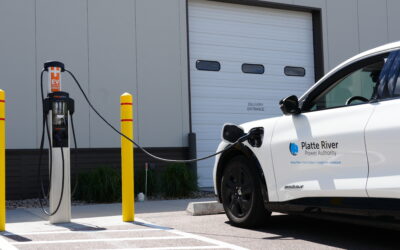Location: Boulder, CO
Fleet Type: Transportation Provider
Narrative
Via Mobility Services (Via) is a 45-year-old Colorado non-profit organization that delivers comprehensive transportation services in eight counties across the state for people with limited mobility. Via’s services range from its Via Paratransit program to a number of contracted services like the City of Boulder’s HOP bus and the Littleton Omnibus.
Via operates 137 vehicles between its Boulder headquarters (90) and its Denver location (47). Via has taken great strides to establish itself as a sustainability leader amongst Colorado transportation providers. The organization has ambitious goals for its HOP buses and Via Paratransit vehicles. By 2030, Via aims to replace the fleet of 17 buses that operate on the City of Boulder’s HOP public transit route with zero-emission buses, and by 2035, Via aims to replace the 120 gas-powered vehicles in the paratransit fleet with zero-emission vehicles (ZEVs). Via has shared that they will be welcoming their first EVs to the paratransit fleet this year! In a recent press release, it was announced that Via and New Day Hydrogen had signed a letter-of-intent that will bring the first public-facing hydrogen fueling center and hydrogen-powered buses to Colorado. Read more here: Via Mobility Services and New Day Hydrogen Join Forces to Bring Hydrogen Trucks to Colorado.
 Via and the City of Boulder have added four electric buses to the HOP fleet. There are three Proterra battery-electric buses in service and one Lightning eMotors City Transit Bus Repower (HOP 15), which no longer runs routes. The City of Boulder has grants secured for at least six more battery-electric buses and is exploring new original equipment manufacturers. Additionally, Via is expecting the delivery of two electric cutaway vans before the end of the year and has secured grants for up to four more. At its Boulder depot, Via houses four chargers (125-kW dual port, two 60-kW, and 50-kW) and has plans to add over five more chargers (two 60- kW chargers and three 24-kW chargers planned) in the near future. The organization is also working with Xcel Energy to future proof the site for reaching its 2030 and 2035 goals.
Via and the City of Boulder have added four electric buses to the HOP fleet. There are three Proterra battery-electric buses in service and one Lightning eMotors City Transit Bus Repower (HOP 15), which no longer runs routes. The City of Boulder has grants secured for at least six more battery-electric buses and is exploring new original equipment manufacturers. Additionally, Via is expecting the delivery of two electric cutaway vans before the end of the year and has secured grants for up to four more. At its Boulder depot, Via houses four chargers (125-kW dual port, two 60-kW, and 50-kW) and has plans to add over five more chargers (two 60- kW chargers and three 24-kW chargers planned) in the near future. The organization is also working with Xcel Energy to future proof the site for reaching its 2030 and 2035 goals.
Via operates a mix of alternative-fuel vehicles (AFVs), including electric, hybrid, compressed natural gas, and clean diesel vehicles. Via’s fleet electrification journey began in 2018 when the organization worked with Lightning eMotors to convert HOP 15, a 2004 diesel-powered asset, to a battery-electric bus. Earlier that year, HOP 15 was sitting at the maintenance depot with a broken engine when Lighting approached them with an innovative idea to save it from the scrapyard. During that summer, the old diesel powertrain was removed and recycled. Lightning then installed the new all-electric powertrain and refurbished the bus interior. The project saved Via and the City of Boulder money compared to replacing HOP 15 with a new battery-electric bus at the time. The retrofit project took only six months, and the bus was back on the road by the fall of 2018. This innovative approach provides a case study on how to work around the high upfront costs of new electric buses, especially at the time deployment. Read more here: Via Hop Bus Repower Case Study.
Additionally, Via’s sustainability commitments extend beyond transportation. Via’s Boulder site was deemed the city’s first Resiliency Hub. In partnership with the City of Boulder, Boulder County, and Pos-En, the project has created an onsite microgrid that utilizes rooftop solar PV, a compressed natural gas generator, and a battery storage system tied to the grid. The site can island and sustain a sheltering facility during a wide-scale power outage. Via has expressed plans to add solar canopies where the chargers are located at the depot. Furthermore, Via has acquired the lot across the street from its headquarters to add more solar capacity and battery storage. Via envisions its entire zero-emission fleet to be powered by renewable energy sources.

Outputs and Outcomes
As Via continues implementing AFVs and bolstering its Boulder depot for future deployments, the organization is making substantial progress toward providing zero-emission transportation to the communities it serves. The electrification of the Via fleet will vastly improve air quality for older adults, people with disabilities, low-income communities, and rural residents. It will also help the City of Boulder reach its climate commitment goal of reducing greenhouse gas (GHG) emissions by 80% by 2050 and Colorado’s goal of reducing GHG emissions by 50% by 2030.
Via’s cutting-edge sustainability work also serves as a valuable resource for transit fleets considering electrification projects. Via participated in CALSTART’s Medium- And Heavy-Duty EV Deployment Data Collection project, which aims to provide real-world comprehensive data on a diverse set of EVs across different U.S. regions. With support from the U.S. Depar
tment of Energy and Drive Clean Colorado, CALSTART tracked Via’s HOP buses for 12 months through vehicle telematics. This project has created a public database for fleet managers nationwide looking to electrify their fleet, with data on how climate, location, and usage might affect the state of charge of the battery and how to plan routes with charging (on-route vs depot). Learn more about the project here: CALSTART Medium- and Heavy-Duty EV Deployment: Data Collection.
Best Practices & Lessons Learned
Via’s fleet electrification journey has not been without its difficulties. Utility demand charges, for example, have led to higher-than-expected electricity bills when adding the 3 Proterra buses. Additionally, there are concerns over Proterra’s recent bankruptcy and how that may affect the service and maintenance of the electric buses. Furthermore, Colorado’s climate presents its own unique set of challenges. The sub-freezing winter days have affected
vehicle performance. Via has struggled with maintaining enough charge to complete HOP routes around town without returning to the depot. Unlike other Colorado transit fleets located in the mountains with diesel heaters to condition the cabin, Via uses an electric heater drawing on energy from the battery. This presents an issue on those cold winter days without access to on-route charging. Via has opened conversations with the City of Boulder about possible on-route inductive charging options or adding auxiliary diesel heaters to mitigate the issue. Overall, the experience has been educational, enabling Via to learn and plan for future implementation.








